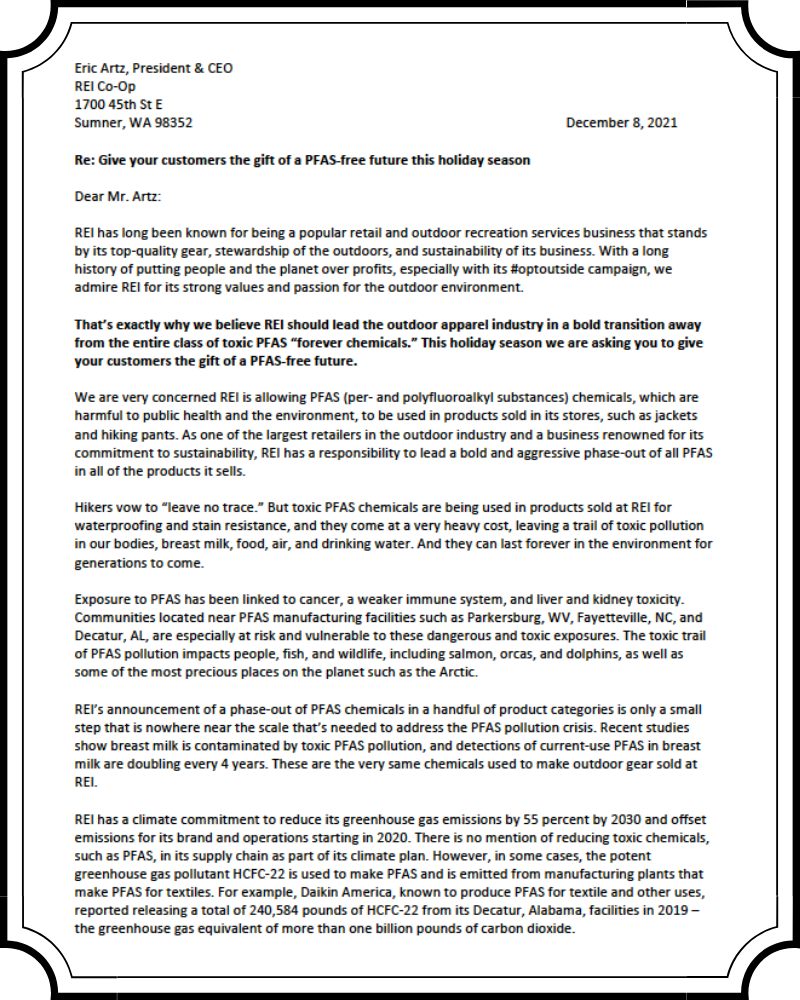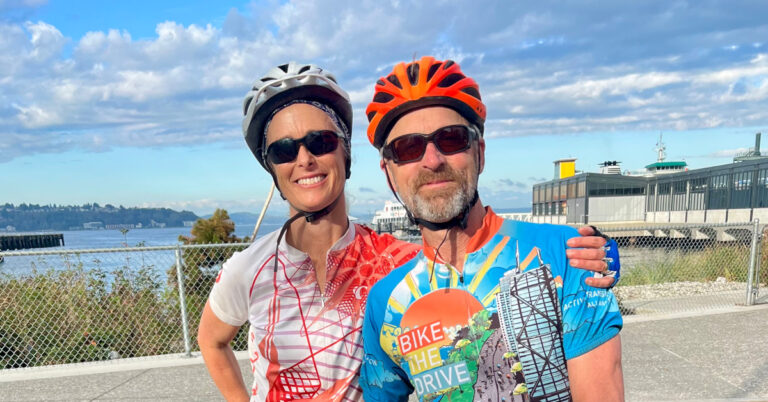Today a group of more than 100 local, state, and national organizations sent a letter to REI’s CEO Eric Artz calling on the company to lead the outdoor apparel industry in a bold transition away from the entire class of toxic PFAS “forever chemicals.” PFAS (per- and polyfluoroalkyl substances) are often used for water-repellent, stain-resistant, and grease-proofing treatments on textiles like outdoor gear.
The letter states:
 “This holiday season we are asking you to give your customers the gift of a PFAS-free future… When REI members and customers buy presents for their friends and family from REI this holiday season, they expect the products to be safe, not laden with chemicals that are leaving a toxic trail of pollution around the world.”
“This holiday season we are asking you to give your customers the gift of a PFAS-free future… When REI members and customers buy presents for their friends and family from REI this holiday season, they expect the products to be safe, not laden with chemicals that are leaving a toxic trail of pollution around the world.”
The letter was signed by:
- National environmental and consumer advocacy organizations such as Clean Water Action, Consumer Reports, Earthjustice, Friends of the Earth, Green America, Greenpeace USA, League of Conservation Voters, NRDC, ParentsTogether, Safer States, Safer Chemicals Healthy Families, and U.S. PIRG;
- Organizations based in REI’s home state of Washington including Earth Ministry/Washington Interfaith Power & Light, Environment Washington, Puget Soundkeeper Alliance, RE Sources, Toxic-Free Future, Washington Environmental Council, Washington Conservation Voters, and WashPIRG;
- Grassroots groups representing communities impacted by PFAS pollution including Clean Cape Fear, Concerned Citizens of WMEL Water Authority, and Merrimack Citizens for Clean Water;
- National public health groups committed to preventing harm from toxic chemicals such as the Alliance of Nurses for a Healthy Environment, Breast Cancer Action, and Learning Disabilities Association of America; and
- State-based groups fighting for strong state regulation of PFAS such as Alaska Community Action on Toxics, Clean and Healthy New York, Defend Our Health, North Carolina Conservation Network, and Vermont Public Interest Research Group.
A growing body of scientific research has found links between exposures to PFAS and a wide range of health problems including cancer, a weaker immune system, and increased risk of thyroid disease. PFAS are often referred to as “forever” chemicals because they are not known to break down in the environment and persist for generations to come.
You can read the full letter to REI here (and at the bottom of this post).
Pressure mounting on REI to prevent PFAS pollution
The letter is part of our national campaign calling on REI to “opt out” of PFAS.
Since we launched the campaign last month, tens of thousands of REI members and customers have sent emails, signed petitions, and made calls to the company urging REI to act. REI members and consumer advocates also gathered at REI stores in five cities across the country including Anchorage (while braving subzero temperatures), Miami, New York, Raleigh, and Seattle while handing out leaflets asking the company to take action on PFAS in its stores.
So far, REI has failed to meaningfully respond to our calls to ban PFAS, which is polluting people, wildlife, and our environment around the world.
With great market power comes great responsibility. As a company committed to sustainability and one of the biggest outdoor retailers in the U.S., REI has a responsibility to lead the industry away from these toxic chemicals.
Join the campaign and sign the petition calling on REI to stop leaving a toxic trail of pollution!
Eric Artz, President & CEO
REI Co-Op
1700 45th St E
Sumner, WA 98352 December 8, 2021
Re: Give your customers the gift of a PFAS-free future this holiday season
Dear Mr. Artz:
REI has long been known for being a popular retail and outdoor recreation services business that stands by its top-quality gear, stewardship of the outdoors, and sustainability of its business. With a long history of putting people and the planet over profits, especially with its #optoutside campaign, we admire REI for its strong values and passion for the outdoor environment.
That’s exactly why we believe REI should lead the outdoor apparel industry in a bold transition away from the entire class of toxic PFAS “forever chemicals.” This holiday season we are asking you to give your customers the gift of a PFAS-free future.
We are very concerned REI is allowing PFAS (per- and polyfluoroalkyl substances) chemicals, which are harmful to public health and the environment, to be used in products sold in its stores, such as jackets and hiking pants. As one of the largest retailers in the outdoor industry and a business renowned for its commitment to sustainability, REI has a responsibility to lead a bold and aggressive phase-out of all PFAS in all of the products it sells.
Hikers vow to “leave no trace.” But toxic PFAS chemicals are being used in products sold at REI for waterproofing and stain resistance, and they come at a very heavy cost, leaving a trail of toxic pollution in our bodies, breast milk, food, air, and drinking water. And they can last forever in the environment for generations to come.
Exposure to PFAS has been linked to cancer, a weaker immune system, and liver and kidney toxicity. Communities located near PFAS manufacturing facilities such as Parkersburg, WV, Fayetteville, NC, and Decatur, AL, are especially at risk and vulnerable to these dangerous and toxic exposures. The toxic trail of PFAS pollution impacts people, fish, and wildlife, including salmon, orcas, and dolphins, as well as some of the most precious places on the planet such as the Arctic.
REI’s announcement of a phase-out of PFAS chemicals in a handful of product categories is only a small step that is nowhere near the scale that’s needed to address the PFAS pollution crisis. Recent studies show breast milk is contaminated by toxic PFAS pollution, and detections of current-use PFAS in breast milk are doubling every 4 years. These are the very same chemicals used to make outdoor gear sold at REI.
REI has a climate commitment to reduce its greenhouse gas emissions by 55 percent by 2030 and offset emissions for its brand and operations starting in 2020. There is no mention of reducing toxic chemicals, such as PFAS, in its supply chain as part of its climate plan. However, in some cases, the potent greenhouse gas pollutant HCFC-22 is used to make PFAS and is emitted from manufacturing plants that make PFAS for textiles. For example, Daikin America, known to produce PFAS for textile and other uses, reported releasing a total of 240,584 pounds of HCFC-22 from its Decatur, Alabama, facilities in 2019 – the greenhouse gas equivalent of more than one billion pounds of carbon dioxide.
More and more states are stepping up to regulate PFAS. In REI’s corporate headquarters state, the new Safer Products for Washington law gives the state agency the authority to ban PFAS in products. The law was adopted to protect sensitive populations such as babies as well as sensitive species such as salmon and orca whales where toxic chemicals build up. Apparel and outdoor gear have already been identified as sources of PFAS, and regulations are not far behind. Other states including California, Colorado, Minnesota, Maine, and New York are targeting products for PFAS bans as well. It is prudent for REI to get out in front of these regulations and phase PFAS out on an aggressive timeline.
We recommend REI take the following steps to prevent PFAS pollution from products sold in its stores:
- Policy: Adopt and publish a bold policy to phase out and ban the entire PFAS class in all brand-name and private-label products REI sells, especially outdoor apparel. This policy should have senior management-level engagement and accountability for suppliers (e.g., third-party testing and disclosure) and measure and publicly report on continuous improvement toward reducing, eliminating, and safely substituting PFAS.
- Goals and metrics: Set clear, ambitious public goals with timelines and quantifiable metrics to measure success in eliminating PFAS in all products and packaging.
- Avoid regrettable substitution: Invest in assessing the safety of alternatives to PFAS using tools like GreenScreen, ChemFORWARD, and Scivera to ensure informed substitution so that suppliers do not move to other harmful replacement chemicals.
- Transparency: Embrace “radical transparency” to meet rising consumer demand for the full public disclosure of alternatives used to replace PFAS. Your members have a fundamental right to know.
- Stay ahead of and support government regulation: REI should also support state and federal policy reform to advance solutions to PFAS.
When REI members and customers buy presents for their friends and family from REI this holiday season, they expect the products to be safe, not laden with chemicals that are leaving a toxic trail of pollution around the world. This holiday season, we urge you to give the gift of a PFAS-free future for your members, and “opt out” of PFAS.
Thank you.
Sincerely,
Mike Schade, Director
Mind the Store
Newburgh, NY
Laurie Valeriano, Executive Director
Toxic-Free Future
Seattle, WA
Liz Hitchcock, Director
Safer Chemicals Healthy Families
Washington, DC
Sarah Doll, Director
Safer States
Portland, OR
Anna Cummins, Executive Director
5 Gyres
Los Angeles, CA
Louis Allen, MD, MPH, Facilitator
Able-Differently
Salt Lake City, UT
Wes Reutimann, Special Programs Director
ActiveSGV
San Gabriel Valley, CA
Veri di Suvero, Executive Director
AKPIRG
Anchorage, AK
Pamela Miller, Executive Director
Alaska Community Action on Toxics
Anchorage, AK
Katie Huffling, Executive Director
Alliance of Nurses for Healthy Environments
Mount Rainier, MD
Cheryl Auger, President
Ban SUP
Pasadena, CA
Karen Wang, Director
Because Health
San Francisco, CA
Eve Fox, Digital Director
Beyond Plastics
Bennington, VT
Krystal Redman, Executive Director
Breast Cancer Action
San Francisco, CA
Robina Suwol, Executive Director
California Safe Schools
Los Angeles, CA
Jenn Engstrom, State Director
CALPIRG
Sacramento, CA
Kelley Dennings, Campaigner
Center for Biological Diversity
Tucson, AZ
Kathryn Alcantar, Interim Policy Director
Center for Environmental Health
Oakland, CA
Jaydee Hanson, Policy Director
Center for Food Safety
Washington, DC
Bobbi Wilding, Executive Director
Clean and Healthy New York
Albany, NY
Emily Donovan, Co-Founder
Clean Cape Fear
Wilmington, NC
Cynthia Luppi, New England Director
Clean Water Action
Boston, MA
Sylvia Broude, Executive Director
Community Action Works
Boston, MA
Brenda Hampton, Administrator
Concerned Citizens of WMEL Water Authority
Courtland, AL
Tom Swan, Executive Director
Connecticut Citizen Action Group
Coventry, CT
Meg Bohne, Associate Director, Campaigns
Consumer Reports
Yonkers, NY
Danny Katz, Executive Director
CoPIRG
Denver, CO
Sarah Woodbury, Director of Advocacy
Defend Our Health
Portland, ME
Tracy Carluccio, Deputy Director
Delaware Riverkeeper Network
Bristol, PA
Jan Dietrick
Dietrick Institute for Applied Insect Ecology
Ventura, CA
Christine Santillana, Legislative Counsel
Earthjustice
Washington, DC
Jessica Zimmerle, Program & Outreach Director
Earth Ministry/Washington Interfaith Power & Light
Seattle, WA
Erica Bloom, Toxics Campaign Director
Ecology Center
Ann Arbor, MI
John Rumpler, Clean Water Program Senior Director
Environment America
Boston, MA
Laura Deehan, State Director
Environment California
Los Angeles, CA
Rex Wilmouth, Senior Program Director
Environment Colorado
Denver, CO
Chris Phelps, State Director
Environment Connecticut
West Hartford, CT
Jennette Gayer, State Director
Environment Georgia
Atlanta, GA
Anya Fetcher, State Director
Environment Maine
Portland, ME
Ben Hellerstein, State Director
Environment Massachusetts
Boston, MA
Bridget Sanderson, State Director
Environment Missouri
Kansas City, MO
Doug O’Malley, State Director
Environment New Jersey
New Brunswick, NJ
Krista Early, Advocate
Environment North Carolina
Raleigh, NC
Celeste Meiffren-Swango, State Director
Environment Oregon
Portland, OR
Luke Metzger, Executive Director
Environment Texas
Austin, TX
Elly Boehmer, State Director
Environment Virginia
Richmond, VA
Pam Clough, Advocate
Environment Washington
Seattle, WA
Shannon Smith, Interim Executive Director
FracTracker Alliance
Pittsburgh, PA
Leatra Harper, Managing Director
FreshWater Accountability Project
Bowling Green, OH
Lisa Archer, Director, Food and Agriculture Program
Friends of the Earth
Washington, DC
Erica Bloom
Great Lakes PFAS Action Network
Ann Arbor, MI
Todd Larsen, Executive Co-Director for Consumer & Corporate Engagement
Green America
Washington, DC
Lisa Ramsden, Senior Oceans Campaigner
Greenpeace USA
Washington, DC
Yolanda B. Alston, Organizer
Harambee House, inc
Savannah, GA
Deanna White, Director
Healthy Legacy Coalition
Minneapolis, MN
Abe Scarr, State Director
Illinois PIRG
Chicago, IL
Kelly Jackson, Co-founder
Indivisible Alta-Pasadena
Altadena, CA
Melissa Jung, Program and Outreach Manager
Inland Ocean Coalition
Boulder, CO
Tiffany Tool, IPEN Network Manager
IPEN
Berkeley, CA
Jose Bravo, Executive Director
Just Transition Alliance
San Diego, CA
Jan Dell, Independent Engineer
The Last Beach Cleanup
Laguna Beach, CA
Jackie Nuñez, Founder
The Last Plastic Straw
Santa Cruz, CA
Michele Colopy, Executive Director
LEAD for Pollinators, Inc.
Akron, OH
Madeleine Foote, Deputy Legislative Director
League of Conservation Voters
Washington, DC
Tamara Massey Garrett, State President
Learning Disabilities Association of Alabama
Montgomery, AL
Tracy Gregoire, Healthy Children Project Director
Learning Disabilities Association of America
Pittsburg, PA
Gregg French, President
Learning Disabilities Association of Connecticut
Fairfield, CT
Carolyn P. Kingsley
Learning Disabilities Association of Georgia
Atlanta, GA
Beverley H Johns, President
Learning Disabilities Association of Illinois
Palos Hills, IL
Betty Riggin, President
Learning Disabilities Association of Maine
Westbrook, ME
Amy Barto, M.Ed., President
Learning Disabilities Association of Michigan
Grand Rapids, MI
Kathryn Cappella, Secretary/Treasurer
Learning Disabilities Association of New York State
Rochester, NY
Dr. Analisa L. Smith, President
Learning Disabilities Association of South Carolina
Irmo, SC
Pamela Smith, RN, HCP Coordinator
Learning Disabilities Association of Texas
Dallas, TX
Gaylia Tanner, Healthy Children Project Coordinator
Learning Disabilities Association of Utah
Sandy, UT
Mitch Beres, President
Learning Disabilities Association of Virginia
Henrico, VA
Diane Sixel, President
Learning Disabilities Association of Wisconsin
Kiel, Wisconsin
Dave Shukla, Operations
Long Beach Alliance for Clean Energy
Long Beach, CA
Emily Scarr, State Director
Maryland PIRG
Baltimore, MD
Janet Domenitz, Executive Director
MASSPIRG
Boston, MA
Laurene Allen, Director
Merrimack Citizens for Clean Water
Merrimack, NH
Johanna Rochester, CSO
Million Marker
Bellingham, WA
Molly Rauch, Public Health Policy Director
Moms Clean Air Force
Washington, DC
Kathleen Curtis, Founder
Moms for a Nontoxic New York
Schenectady, NY
Sujatha Bergen, Health Campaigns Director
Natural Resources Defense Council (NRDC)
Washington, DC
Heidi Sanborn, Executive Director
National Stewardship Action Council
Sacramento, CA
Tiffany Gladney
NC Child
Raleigh, NC
Kate Fulbright, Affiliate Organizer
NC Conservation Network
Raleigh, NC
Katie Craig, State Director
NCPIRG
Raleigh, NC
Jamie Pang, Environmental Health Program Director
Oregon Environmental Council
Portland, OR
Alexis Baden-Mayer, Political Director
Organic Consumers Association
Finland, MN
Charlie Fisher, State Director
OSPIRG
Portland, OR
Pulin Modi, Director of Campaigns
ParentsTogether
Washington, DC
Stiv Wilson, CoDirector
Peak Plastic Foundation
Olympia, WA
David Masur, Executive Director
PennEnvironment
Philadelphia, PA
Emma Horst-Martz, Advocate
PennPIRG
Philadelphia, PA
Stephanie Weiner, Board Member
Plastic Free Delaware
Wilmington, DE
Alyssa Barton, Policy Manager
Puget Soundkeeper Alliance
Seattle, WA
Eleanor Hines, North Sound Baykeeper, Lead Scientist
RE Sources
Bellingham, WA
Diane Wilson, Executive Director
San Antonio Bay Estuarine Waterkeeper
Seadrift, TX
Ronni Solman, Steering Committee Member
SoCal 350 Climate Action
Los Angeles, CA
Betty Riggin
Sophia’s House
Lewiston, ME
Jean Zhuang, Staff Attorney
Southern Environmental Law Center
Chapel Hill, NC
Sam Pearse, Campaigns Manager
The Story of Stuff Project
Berkeley, CA
Robin Schneider, Executive Director
Texas Campaign for the Environment
Austin, TX
Connor Kippe, Policy Advocate
Toxic Free NC
Durham, NC
Joanie Steinhaus, Gulf Program Director
Turtle Island Restoration Network
Galveston, TX
Chris Peck, Owner
Urban Ecology
Pasadena, CA
Emily Rogers, Zero Out Toxics Advocate
U.S. PIRG
Washington, DC
Lauren Hierl, Executive Director
Vermont Conservation Voters
Montpelier, VT
Jon Groveman, Policy and Water Program Director
Vermont Natural Resources Council
Montpelier, VT
Mindy Roberts, Puget Sound Program Director
Washington Environmental Council and Washington Conservation Voters
Seattle, WA
Greg Wingard, Executive Director
Waste Action Project
Covington, WA
Nicole Walter, Advocate
WashPIRG
Seattle, WA
Robin Broder, Deputy Director
Waterkeepers Chesapeake
Takoma Park, MD
Megan Severson, State Director
Wisconsin Environment
Madison, WI
Michelle Naccarati-Chapkis, Executive Director
Women for a Healthy Environment





